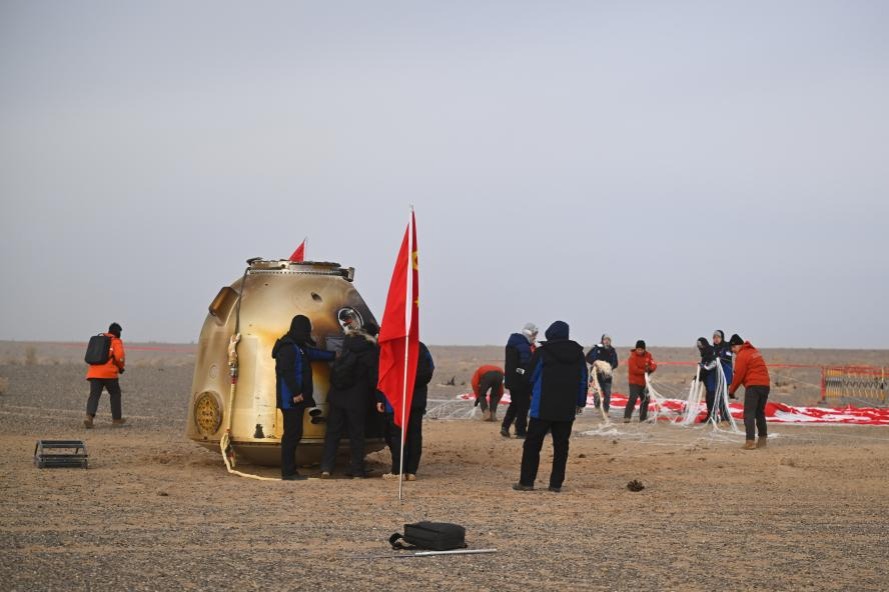Ancient sage's grand entrance a prologue

In making a grand entrance into one of the world's great cities, who would think of doing so on the back of an ox? It was just that very mode of transportation — one made of bronze, no less — that was chosen for the conveyance of one of China's greatest thinkers of ages past in Moscow recently.
The man in question was the ancient philosopher Laozi, who lived about 2,500 years ago, arriving this time in the form of a sculpture carved by Wu Weishan, director of the National Art Museum of China in Beijing.
After two-and-a-half millennia, this was Laozi's first "trip" to Russia, Wu said.
The likeness of Laozi was unveiled at Stroganov Moscow State University of Arts and Industry on April 22 as part of an exhibition of Wu's works that are an amalgam of Chinese philosophy and modern aesthetics.
For one week starting on April 25, the Chinese on-stage choreographed drama Wing Chun enthralled Russians in sold-out performances at the Bolshoi Theatre in Moscow and the Mariinsky Theatre in St. Petersburg. The production, by the Shenzhen Opera and Dance Theater, intertwines martial arts heritage and dramatic storytelling to honor the Wing Chun grandmaster Yip Man.
In fact, people in Moscow were able to enjoy 10 bilateral cultural events last month. The events were part of a long series of celebrations titled "2024-25 China-Russia Years of Culture".
Hundreds of exchange programs attached to the initiative "have enabled our peoples to explore each other's civilizational treasures", said China's Ambassador to Russia Zhang Hanhui.
Galina Kulikova, first vice-president of the Russia-China Friendship Association, said, "Through exchanging art troupes for reciprocal tours, organizing cultural and artistic events and hosting exhibitions in each other's countries, China and Russia are promoting mutual understanding and trust between their peoples."
Cultural exchanges between the two countries go far beyond these efforts, Kulikova said, with another element being tourism exchanges. The flow of tourists between both countries has increased markedly in recent years, she said, and the destinations that these tourists are choosing to visit have become much more diverse.
"Moscow and St. Petersburg are obviously among the most popular destinations, but more and more Chinese are traveling to places such as Murmansk and the Kamchatka Peninsula for winter sports, to see the northern lights, taste caviar and enjoy outdoor hot springs," said Kulikova, the second Russian after President Vladimir Putin to receive China's Friendship Medal.
"As for Russians, they're also venturing beyond big cities such as Beijing and Shanghai and the seaside resort of Sanya in Hainan province, heading for the likes of Urumqi in the Xinjiang Uygur autonomous region and Lhasa in the Xizang autonomous region. By doing so, they get a true, multidimensional and panoramic view of China."
Wang Rui, deputy director of the Chinese Culture Center in Moscow, said the center has launched many new cultural and educational programs since the start of the "2024-25 China-Russia Years of Culture".
"Russians from all walks of life are coming to the center to learn Chinese, painting, chess and dancing."
More Russians are looking for structured Chinese-language and cultural education for their children from an early age, and a growing number of Chinese parents working in Russia aspire to bring their children with them while ensuring their children maintain access to authentic Chinese education.
Against this background, the first full-time Russia-China international school was set up in Moscow last year. "We have 30 students now, aged 6 to 13, from both countries," the school's principal, Wu Hao, said. "That may not seem like many, but I'm confident the school will grow, which augurs well for China-Russia cultural exchanges."
Cultural collaboration will extend far beyond the present festivities, Kulikova said.
"This is a prologue rather than a finale," Kulikova said. "Our collaboration on culture, education and tourism will catalyze breakthroughs in trade, technology and green energy partnerships."
- China's prosecutors intensify crackdown on crime, charge 1.27 million in first 11 months of 2025
- China sends task force after deadly explosion in Inner Mongolia
- China's grain and livestock output rise in 2025
- Cold wave sweeps China, forcing school closures and snow response
- Guangzhou hospitals expand use of cell, gene therapies
- State Council to supervise probe into factory explosion in North China's Inner Mongolia




































